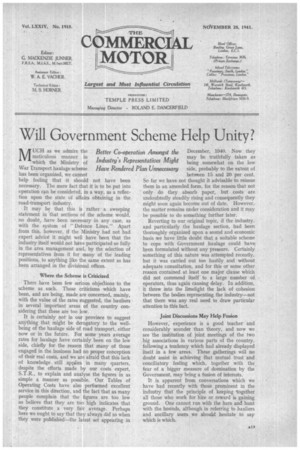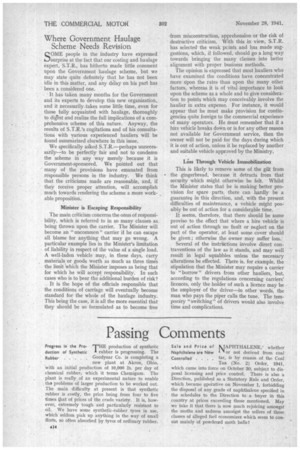Will Government Scheme Help Unity?
Page 15

Page 16

If you've noticed an error in this article please click here to report it so we can fix it.
MUCH as we admire the meticulous manner in which the Ministry of War Transport haulage scheme has been organized, we cannot help feeling that it should not have been necessary. The mere fact that it is to be put into operation can be considered, in a way, as a reflection upon the state of affairs obtainim in the road-transport industry.
It may be that this is rather a sweeping statement in that sections of the scheme would, no doubt, have been necessary in any case, as with the system of "Defence Lines." Apart from this, however, if the Ministry had not had expert advice it might well have been that the industry itself would not have participated so fully in the area management and, by the selection of represen,tativafi from it for many of the leading positions, to anything like the same extent as has been arranged in the divisional offices.
Where the Scheme is Criticized There have been few serious objeclions to the scheme as such. Those criticisms which have been, and are being, made are concerned, mainly, with the value of the rates suggested, the hauliers in several important areas of the country considering that these are too low.
It is certainly not in our province to suggest anything that might be derogatory to the wellbeing of the haulage side of road transport, either now or in the futtire. For some years average rates for haulage have certainly been on the low side, chiefly for the reason that many of those engaged in the business had no proper conception of their real costs, and we are afraid that this lack of knowledge still applies in many quarters, despite the efforts made by our costs expert, S.T.R., to explain and analyse the figures in as simple a manner as possible. Our Tables of Operating Costs have also performed excellent service in this direction, and the fact that as many people complain that the figures are too low as believe that they are too high indicates that they constitute. a very fair average. Perhaps here we ought to say that they always did so when they were published—the latest set appearing in December, 1940. Now they may be truthfully taken as being somewhat on the low side, probably to the extent of between 15 and 20 per cent. So far we have not thought it advisable to reissue them in an amended form, for the reason that not only do they absorb paper, but costs are undoubtedly steadily rising and consequently they might soon again become out of date. However, the matter remains under consideration and it may be possible to do something further later. • Reverting to our original topic, if the industry, and particularly the haulage section, had been thoroughly organized upon a sound and economic basis we have little doubt that a suitable scheme to cope with Government haulage could have been formulated without any pressure. Certainly something of this nature was attempted recently, but it was carried out too hastily and without adequate consultation, and for this or some other reason contained at least one major clause which did not commend itself to a large number of operators, thus again causing delay. In addition, it threw into the limelight the lack of cohesion between the bodies representing the industry—not that there was any real need to draw particular attention to this fact.
Joint Discussions May Help Fusion However, experience is a _good teacher and considerably sounder than theory, and now we• see 'the institution of joint meetings of the two big associations in various parts of the country, following a tendency which had already displayed itself in a few areas. These gatherings will no doubt assist in achieving that mutual trust and conciliatory feeling which, together with the fear of a bigger measure of domination by the Government, may bring a fusion of interests.
It is apparent from conversations which we have had recently with those prominent in the industry that the principle of keeping 'together all those who work for hire or reward Is gaining ground. One cannot run with the hare and hunt with the hounds, although in referring to hauliers and ancillary users we shoal hesitate to say which is which.
Where Government Haulage Scheme Needs Revision
SOIVIE people in the industry have expressed surprise at the fact that our costing and haulage expert, S.T.R., has hitherto made little comment upon the Government haulage scheme, but we may state quite definitely that he has not been idle in this matter, and any delay on his part has been a considered one.
It has taken many months for the Government and its experts to develop this new organization, and it necessarily.takes some little time, even for those fully acquainted with haulage, thoroughly to digest and realize the full implications of a comprehensive scheme of this nature. Anyway, the results of S.T.R.'s cogitations and of his consultations with various experienced hauliers will be found summarized elsewhere in this issue.
We specifically asked S.T.R.—perhaps unnecessarily—to be perfectly fair and not to condemn the scheme in any way merely because it is Government-sponsored. We pointed out that many of the provisions have emanated from responsible persons in the industry. We think that the criticisms made are reasonable, and, if they receive proper attention, will accomplish much towards rendering the scheme a more workable proposition.
Minister is Escaping Responsibility The main criticism concerns the onus of responsibility, which is referred to in so many clauses as. being thrown upon the carrier. The Minister will become an " uncommon " carrier if he can escape all blame for anything that may go wrong. A particular example lies in the Minister's limitation of liability in respect of the value of a single load. A well-laden vehicle may, in these days, carry materials or goods worth as much as three times the limit 'which the Minister imposes as being that for which he will accept responsibility. In such cases who is to bear the additional burden of risk?
It is the hope of the officials responsible that the conditions of carriage will eventually become standard for the whole of the haulage industry. This being the case, it is all the more essential that they should be so formulated as to become free from ,misconstruction, apprehension or the risk of destructive criticism. With this in view, S.T.R. has selected the weak pcints and has made suggestions, which, if followed, should go a long way towards bringing the many clauses into better alignment with proper business methods. The opinion is expressed that most hauliers who have examined the conditions have concentrated more upon the rates than upon the many other factors, whereas it is of vital importance to look upon the scheme as a whole and to give consideration to points which may conceivably involve the haulier in extra expense. For instance, it would appear that he must make provision for contingencies quite foreign to the commercial experience of many operators. He must remember that if a hire vehicle breaks down or is for any other reason not available for Government service, then the owner will not be paid for the days during which it is out of action, unless it be replaced by another and suitable vehicle approved by the Ministry.
Lass Through Vehicle Immobilization This is likely to remove some of the gilt from • the gingerbread, because it detracts from that security which might otherwise be felt. Whilst the Minister states that he is making better provision for spare parts, there can hardly be a guarantee in this direction, and, with the present difficulties of maintenance, a vehicle might possibly be out of action for a considerable time.
It seems, therefore, that there should be some proviso to the effect that where a hire vehicle is out of action through no fault or neglect on the part of the operator, at least some cover should be given ; otherwise the owner may suffer loss.'
Several of the instriactions involve direct contraventions of the law as it stands, and may well result in legal squabbles unless the necessary alterations be effected. There is, for example, the stipulation that the Minister may require a carrier to " borrow " drivers from other hauliers, but, according to the regulations concerning carriers' licences, only the holder of such a licence may be the employer of the driver—in other words, the man who pays the piper calls the tune. The temporary "switching" of drivers would also involve time and complications.




















































